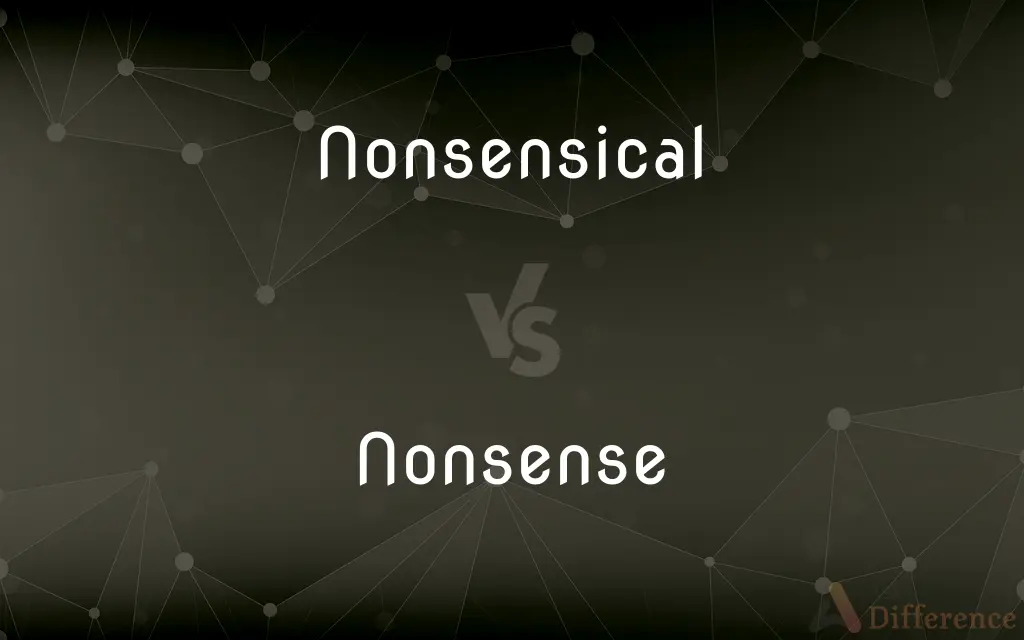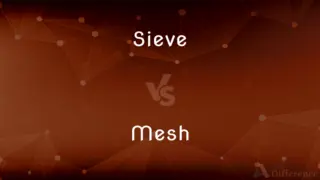Nonsensical vs. Nonsense — What's the Difference?
By Urooj Arif & Fiza Rafique — Updated on April 22, 2024
Nonsensical describes ideas or statements that lack sense or meaning, whereas nonsense refers directly to things that are senseless or absurd.

Difference Between Nonsensical and Nonsense
Table of Contents
ADVERTISEMENT
Key Differences
Nonsensical is an adjective used to describe something that is absurd or illogical, implying a quality or characteristic. Whereas, nonsense is a noun that refers to the subject matter or content that is inherently senseless.
Nonsensical can be applied to situations, statements, or reasoning that defy logical explanation. On the other hand, nonsense often refers to meaningless words, phrases, or overall communication.
In usage, nonsensical might describe the nature of a discussion or argument that goes nowhere. Conversely, nonsense could be used to describe the actual words spoken or written that are unintelligible or without informative value.
Literature often uses nonsensical to critique the irrational elements within a plot or a character’s dialogue, while nonsense is frequently found in genres like absurdism or children’s literature, emphasizing playful or imaginative elements that defy conventional logic.
The reception of something nonsensical is typically negative, as it denotes a lack of reason or coherence. In contrast, nonsense can be embraced positively in creative contexts where innovation and imagination are prioritized over rational clarity.
ADVERTISEMENT
Comparison Chart
Part of Speech
Adjective
Noun
Usage
Describes things or ideas that are absurd or illogical
Refers to absurd or illogical words, actions, or ideas
Contexts
Often used in formal critiques or discussions about logic
Common in casual, creative, or dismissive contexts
Connotation
Generally negative, implies irrationality or lack of sense
Can be negative or playful, often seen in creative writing
Examples in Literature
Found in critiques of plot or character logic
Used in absurdism, children's books, and experimental narratives
Compare with Definitions
Nonsensical
Unintelligible; not able to be understood.
The instructions were so poorly written that they were completely nonsensical.
Nonsense
Material in literature or other media meant to be playful or humorous rather than logical.
The book was filled with delightful nonsense that entertained the children.
Nonsensical
Illogically constructed; lacking coherent meaning.
The debate devolved into a series of nonsensical arguments.
Nonsense
Something not intended to be taken seriously.
They enjoyed the play's light-hearted nonsense.
Nonsensical
Absurd; ridiculously illogical.
His theory was dismissed as completely nonsensical.
Nonsense
A concept or idea that is absurdly illogical.
The notion that the Earth is flat is complete nonsense.
Nonsensical
Foolish, lacking common sense.
Making such a decision under these circumstances would be nonsensical.
Nonsense
Words or language having little or no sense or meaning.
He spoke in nonsense just to confuse the audience.
Nonsensical
Having no meaningful connection with reality.
The plot of the movie was fun but entirely nonsensical.
Nonsense
Useless or ineffectual language, activities, or ideas.
All this fuss about celebrity gossip is just nonsense.
Nonsensical
Lacking intelligible meaning
A nonsensical jumble of words.
Nonsense
Nonsense is a communication, via speech, writing, or any other symbolic system, that lacks any coherent meaning. Sometimes in ordinary usage, nonsense is synonymous with absurdity or the ridiculous.
Nonsensical
Foolish; absurd
Nonsensical ideas.
Nonsense
Words or signs having no intelligible meaning
A message that was nonsense until decoded.
Nonsensical
Without sense; absurd.
Nonsense
Subject matter, behavior, or language that is foolish or absurd.
Nonsensical
Without sense; unmeaning; absurd; foolish; irrational; preposterous.
Nonsense
Extravagant foolishness or frivolity
A clown's exuberant nonsense.
Nonsensical
Completely devoid of wisdom or good sense;
The absurd excuse that the dog ate his homework
That's a cockeyed idea
Ask a nonsensical question and get a nonsensical answer
A contribution so small as to be laughable
It is ludicrous to call a cottage a mansion
A preposterous attempt to turn back the pages of history
Her conceited assumption of universal interest in her rather dull children was ridiculous
Nonsense
Matter of little or no importance or usefulness
A chatty letter full of gossip and nonsense.
Nonsensical
Having no intelligible meaning;
Nonsense syllables
A nonsensical jumble of words
Nonsense
Insolent talk or behavior; impudence
Wouldn't take any nonsense from the children.
Nonsense
(Genetics) Of or relating to a mutation in a structural gene that changes a nucleotide triplet into a stop codon, thus prematurely terminating the polypeptide chain during protein synthesis.
Nonsense
Used to express disagreement or exasperation.
Nonsense
Letters or words, in writing or speech, that have no meaning or pattern or seem to have no meaning.
After my father had a stroke, every time he tried to talk, it sounded like nonsense.
Nonsense
An untrue statement.
He says that I stole his computer, but that's just nonsense.
Nonsense
That which is silly, illogical and lacks any meaning, reason or value; that which does not make sense.
Nonsense
Something foolish.
Nonsense
(literature) A type of poetry that contains strange or surreal ideas, as, for example, that written by Edward Lear.
Nonsense
(biology) A damaged DNA sequence whose products are not biologically active, that is, that does nothing.
Nonsense
To make nonsense of;
Nonsense
To attempt to dismiss as nonsense; to ignore or belittle the significance of something; to render unimportant or puny.
Nonsense
(intransitive) To joke around, to waste time
Nonsense
Nonsensical.
Nonsense
(biochemistry) Resulting from the substitution of a nucleotide in a sense codon, causing it to become a stop codon (not coding for an amino-acid).
Nonsense
An emphatic rejection of something one has just heard and does not believe or agree with.
Nonsense
That which is not sense, or has no sense; words, or language, which have no meaning, or which convey no intelligible ideas; absurdity.
Nonsense
Trifles; things of no importance.
Nonsense
A message that seems to convey no meaning
Nonsense
Ornamental objects of no great value
Nonsense
Having no intelligible meaning;
Nonsense syllables
A nonsensical jumble of words
Common Curiosities
What does nonsensical mean?
Nonsensical refers to something that is absurd, illogical, or lacking sense.
How do you use the word nonsensical in a sentence?
You might say, "His explanation was so complicated and nonsensical that nobody understood it."
Is there a positive use of the term nonsensical?
Although less common, nonsensical can be used in a mildly positive or humorous context when referring to something whimsically illogical, like in some forms of creative art or writing.
Can something be nonsensical but still be true?
While something nonsensical is usually illogical, true facts or phenomena might sometimes appear nonsensical if they defy conventional understanding.
Can nonsense be meaningful in any context?
Yes, in poetry, music, and certain forms of comedy, nonsense can be used effectively to evoke emotions, playfulness, or to provoke thought about language and meaning itself, despite or because of its inherent lack of conventional sense.
How does nonsense function in literature?
In literature, nonsense is often used to challenge the boundaries of conventional narrative logic, to entertain, or to invoke whimsical or surreal experiences, particularly in genres like children's fiction or surrealism.
What are examples of nonsense?
Nonsense includes gibberish texts, absurd plots in stories, or illogical theories.
Is nonsense always negative?
Not necessarily; in creative contexts like poetry or fantasy, nonsense can be used to enrich the narrative.
What is the difference between nonsensical and nonsense?
Nonsensical is an adjective describing something as lacking sense or logical coherence, while nonsense is a noun that refers to speech, text, or ideas that are inherently senseless or absurd.
Can a person be described as nonsensical?
Yes, describing a person as nonsensical typically refers to their ideas or the way they communicate as being illogical or hard to understand.
Share Your Discovery

Previous Comparison
Spanko vs. Spanker
Next Comparison
Sieve vs. MeshAuthor Spotlight
Written by
Urooj ArifUrooj is a skilled content writer at Ask Difference, known for her exceptional ability to simplify complex topics into engaging and informative content. With a passion for research and a flair for clear, concise writing, she consistently delivers articles that resonate with our diverse audience.
Co-written by
Fiza RafiqueFiza Rafique is a skilled content writer at AskDifference.com, where she meticulously refines and enhances written pieces. Drawing from her vast editorial expertise, Fiza ensures clarity, accuracy, and precision in every article. Passionate about language, she continually seeks to elevate the quality of content for readers worldwide.














































